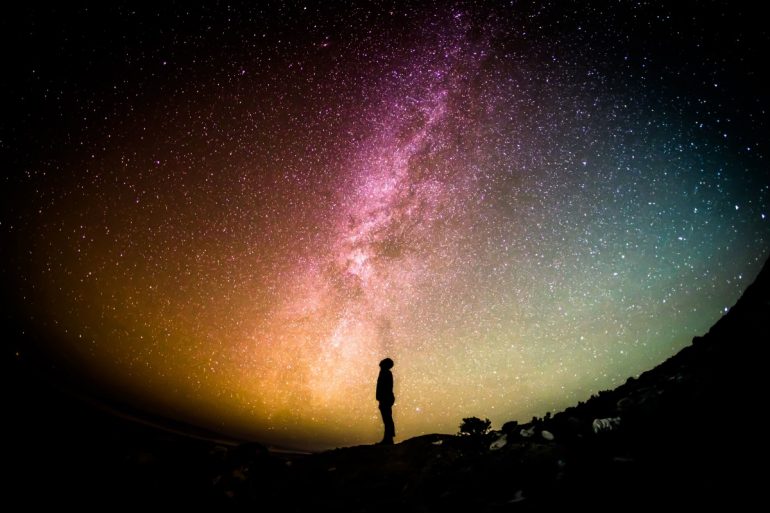Grief isn’t something children are born understanding. At six years of age, I stood in front of the window gazing out at the darkness and up into the star speckled sky. I looked out into the darkness of the night and strained to understand how someone I loved could be taken from me. The moment was so laden with grief and sorrow, but the stars shined bright in that terrific darkness.
Star Gazing
Months earlier, I lay on the damp grass with Gramps staring at the sky. The cicadas hummed, their song vibrating in rhythm to the pulse in my arms. The damp air hung heavy as the heat of the day retreated, leaving behind its beads of perspiration on the blades of grass. I breathed in the smell of the grass and my ears caught the sound of some wild thing running through the woods. I pushed in closer to my grandfather. His scratchy white beard kissed my forehead and he wrapped his arm around my shoulders. “Look,” he said, pointing up to the darkening sky. Moments before, the soft grays and pinks had filled the dome of the sky, coloring the few lingering clouds the hue of cotton candy. The colors had retreated into darkness and my eyes followed his outstretched finger, locating the first star of the night. We watched as the darkness filled with light, as one by one, the stars punched their way through the growing night.
Later, when we learned that my Gram had terminal cancer, my family moved in to help care for her. Those evenings of sky watching became more and more frequent and I’d often fall asleep curled up next to my Gramps under the star-lit sky. So it’s no wonder that in the dark hours of the night when Gram died, wakened to the sound of my mother crying out in grief, I walked to the window and stood before the vast darkness of the night. I chose the brightest star in the sky and told my mother, “That’s the star that Gram rode to heaven.”
The Search for Answers
Heaven was an idea that I just couldn’t understand. It was a place, like your home is a place, or even your hometown is a place. But it was far away, or at least I assumed so since I had never been there and no one had seen it. Once, when I was four or five, I proudly pronounced that heaven was in Richmond, Virginia. My logic was sound: an aunt I loved dearly lived there, I had not been there, and it was very far away. It was the capital city of our state; therefore, it was safe to assume it to be the same for our faith; a capital city with golden streets and pearly gates. The adults laughed and patted me on the head for my childish simplicity.
As an adult, I can’t say that I understand heaven any more than I did as a child. What happens to the part of us that isn’t material once we die? What becomes of our minds, our love, our feelings? Is our soul composed of mere neurological switches that our physical bodies tinker with and all the while, we impose eschatological ideas that suggest a part of us that lives on into eternity? Or perhaps there really is a tangible soul that once departed from this world finds rest somewhere, in some part of time and space, congregated with all the souls of those who have gone before us? The more I know in life, the less certain I am about heaven. I’ve been to Richmond, Virginia by now, and the only certain thing I can say about heaven is that it most certainly is not there. There were no pearly gates to greet me, and the humidity and heat in summer better mirrors the ideas of hell I had learned of as a child. So, where is heaven after all? Why do I continue to look to the night sky all these years later, and wonder if it lies just beyond the veil of stars? Do I really believe in the celestial cloud-land where gates of pearl protrude from the tops of cumuli and streets of gold pave the dull gray nimbus? Or is it that despite everything humans have come to understand about space, it continues to challenge the limits to our human imagination?
The Limits of our Knowledge
The night sky remains a mystery to us, despite new and amazing revelations from scientists. There is so much mystery in the universe that cannot be explained. Dark matter, black holes, distant galaxies, and stars so far away their light has yet to reach us. Scientists have known that the universe was expanding since the 1920s, but it was assumed that the expansion would slow down. Instead, in 1998, they discovered that this expansion is speeding up. “It is propelled by something,” says astrophysicist Mario Livio.[ref]Transcript: Mario Livio – Mysteries of an Expanding Universe.” On Being. June 15, 2015. onbeing.org.[/ref] “For lack of a better name, we call this something ‘dark energy,’ and we now know that this dark energy is more than 70 percent of the energy of the universe. But we still don’t know what it is.” The sheer magnitude of space evades us. Mysterious forces urge our universe forward, and we reach the limits of our understanding again and again. And so, I sit beneath the dome of the sky, wrapped in blankets and gape at the showers of meteors, or watch as the moon looms large in the horizon as it rises, and I am filled with mystery and awe. I ache with unknowing and the question of the psalmist from so long ago haunts me: “What is mankind that you are mindful of them, human beings that you care for them?” (Psalm 8:4)
Sometimes this question haunts me at night, lying in the dark of my room. It haunted me as a child as well. I’d often lie in bed at night, feeling so small and insignificant. I would close my eyes; focus on the leftover noise of light dancing like stars across the backs of my eyelids. Eventually I’d fall asleep, but not before feeling the peace and calm of flying through an inky black sky with millions of stars whizzing by. This journey inward touched the hem of an answer to the psalmist… Even today, I grasp the hem, but the pattern evades my understanding; my answers remain scrappy replicas of an intricate explanation. Perhaps heaven is like the night sky—vast and unknowable—so it makes sense that at age six, I reasoned my Gram rode a star to heaven, returning to the mystery of everything.
A Mystery Unraveled
On a hot summer afternoon in August, my mother and I climbed into our burgundy Ford Taurus. We rode talking to one another, about what I can’t remember. As we approached a busy intersection, I watched as the green light danced in the heat of the afternoon. Time slowed down as, out of the corner of my eye, I saw an old Lincoln Town Car barreling towards its red light. I looked back at our light to be sure it was green, and a wave of panic washed over me. I realized the car wasn’t going to stop and my mother was just about to enter the intersection. My mother slammed on her brakes, threw her arm across my chest as we faced the inevitable crash. As we made impact, I remember the feeling of being held back as my arms and legs flew forward. As we waited for the police to arrive, I thought about how thankful I was for the bright red brand of the seatbelt that seared its gift of life across my chest.
Grandaddy hadn’t been blessed with that gift. The truck that pulled out in front of him never saw him coming. Instead of bracing for impact, my grandfather had tried to veer off onto a side road, but momentum directed him instead to a tall oak tree. He probably died upon impact, the adults whispered to one another. He wasn’t wearing his seatbelt and had flown through the windshield of his car. I sat in the living room with my cousin and brother, trying to play quietly, listening to the adults whisper.
Days later, at the funeral home, the family received visitors who came bearing sympathy and big words. Adults mingled and talked somberly, politely, but none of them seemed to see my brother and me, standing waist high hiding behind and between the bodies of our parents. I’d occasionally walk over and look up at the casket. My eyes level with the edge of the glossy wooden box, I could only make out the familiar profile of my grandfather’s face. Years later, I would visit Grandfather Mountain in the Blue Ridge Mountains of North Carolina, only to be stunned by the profile of a dead man laying in a casket.
Uncle Johnny made his way over to me and scooped me up in his arms. We stood there looking down on my grandfather resting in his casket. Remembering the whispers of the adults, I leaned over to see where my grandfather might have scratches on his head from breaking through the windshield. At the first hint of a scrape I recoiled, weeping into my uncle’s neck. He said nothing and walked me outside into the darkness of night. We stood there in the parking lot, my face buried in his neck, my arms wrapped tight around his shoulders, and his arms holding me tight.
“Look,” he whispered into my ear. I raised my damp face, my hair plastered to my cheek, and looked at him. His face was tilted towards the sky, and I noticed his outstretched hand. I followed his gaze and gasped. The moonless sky was black and the galaxy spread across the darkness. Millions of stars blinked their way into the night, and I found myself lost in the vacuum of the heavens. My uncle said nothing, and as we looked up together I felt quieted. There under the skies with my uncle, the overwhelming grief I felt grew small in the light of all of that bigness. There was room for the immense grief I felt as a child, a grief that had, until that moment, felt as though it would consume me. I looked back at my uncle only to see his damp cheeks drying in the starlight, and as we looked back up to the sky, our grief found a place in the stars.
Our Return to Star-Stuff
Carl Sagan once said, “The nitrogen in our DNA, the calcium in our teeth, the iron in our blood, the carbon in our apple pies were made in the interiors of collapsing stars. We are made of star-stuff.” [ref]Sagan, Carl. Cosmos (Ballantine Books, 2011), Kindle Edition. Kindle Locations 3872-3873.[/ref] Maybe the grief we feel in the loss of our loved ones is the remembrance of collapsing in the stars from which we come. Perhaps all who have died have gone on before us, returning to the star-stuff from which we came. I wonder if they ignite and shine towards us in the night sky. It sounds like the explanation of a child, but perhaps that is what my faith is missing in those moments of grief; the simplest explanation of heaven just above us, visible and real, and yet just out of reach.
And so I return to the meadow, my children in tow, and we spread blankets on the damp grass and watch as the light from the heavens breaks forth. I raise my hand and point, as so many have done for me, and we set our sights on the lights of those who have gone before us, reveling in the mystery of heaven.





